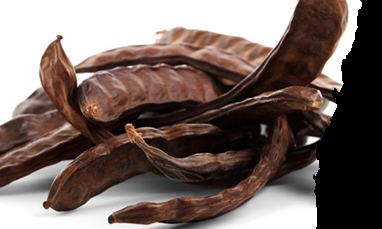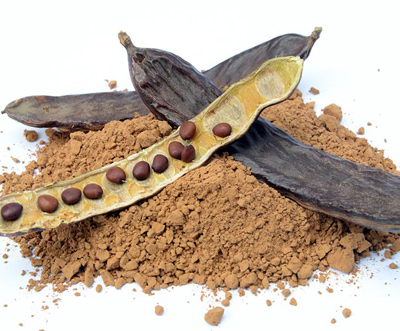The Moroccan carob exporter contain seeds which produce a sticky substance known as tragasol.Tragasol stabilizes and thickens foods such as cream, salad dressings which is often used as a stabilizer and thickener in foods such as salad dressings, cheese and so on. Carob flour made from the seed residue is helpful to diabetics.carob of Morocco is not cultivated in those regions. Carob, or “Ceratonia Siliqua”, is cultivated in the Mediterranean region. It is mostly cultivated in the eastern and southern area of Spain. It’s natural habitat is Southern Anatolia, Cyprus, Syria, Greece, Spain, Morocco, Tunisia, Algeria, Israel and Libya. It is an evergreen tree with large and shiny leaves. It grows in warm climates and may live to be 120 years old. Carob contains carbohydrates, tannins, proteins, minerals and dietary fibers. It is included in dairy products, baked goods, snacks and cereal as dietary fiber.Carob tannins contain Gallic acid that works as an analgesic, anti-allergic, antibacterial, antioxidant, antiviral and antiseptic.Carob of Morocco improves digestion and lowers cholesterol level in the blood.It is used for treating diarrhea in children and adults alike. Since it does not contain caffeine, carob benefits people with high blood pressure.
carob of Morocco is an evergreen flowering shrub native to the Mediterranean region. Cultivated for its edible seeds and most commonly sold in powder form in health food stores,Moroccan carob is best known for its similar taste to that of chocolate: sweet, as well as slightly nutty. As such, carob is commonly used as a chocolate substitute in baked good and beverage recipes.The carob tree (Certonia siliqua), grown extensively in the Middle East, produces a long pod which, when ground into powder, tastes much like chocolate. Many people cannot tell the difference; others can discern a difference but they prefer to avoid chocolate and are grateful for a close second.Regular use of carob helps in preventing lung cancer. The vitamin E content in carob helps in treating cough, flu, anemia and osteoclasis. The Gallic acid in carob helps in preventing and treating polio in children.
Carob fights against osteoporosis, due to its richness in phosphorus and calcium. Carob pod exporter husks are chewed by singers to clear the voice and throat.
carob is naturally sweet and is three times richer in calcium than chocolate, but with one-third fewer calories and seventeen times less fat. Carob is also a rich source of pectin, the substance which makes jams and jellies “jell.” Recent research indicates that pectin may be helpful in lowering your cholesterol level. Moroccan Carob tree is also known as the locust tree and lives on for more than 100 years. Carob health benefits are largely unrecognized by the modern world even though carob of Morocco is being consumed since ancient times
export carob fruit extracts, as in carob molasses, potentially benefit people suffering from a group of lung disorders, including chronic asthmatic bronchitis and emphysema, known as chronic obstructive pulmonary disease, or COPD. Research published in the September 2006 edition of the journal “Respirology” observed the effects of low-dose theophylline on COPD patients. Over a one-year period, 110 participants with COPD received either 100 mg of slow-release theophylline or a placebo. Subjects receiving theophylline experienced fewer episodes, exacerbations and had fewer clinical visits than those taking a placebo. Scientists concluded that low-dose oral theophylline is an effective and well-tolerated long-term treatment for stable COPD; however, additional scientific information is needed to conclusively prove the effectiveness of Moroccan carob extracts for the treatment
carob molasses on your morning pancakes may provide you with beneficial nutrients and natural chemicals to improve your health. For instance, the juicy part the grape, used to make molasses, contains vitamins, including A, C and B6, along with minerals such as potassium, calcium, iron and magnesium.Moroccan Carob molasses contains vitamins and minerals including riboflavin, vitamin A, calcium, iron, phosphorus and potassium. In addition, carobs are 80 percent protein, according to the Australian National University. Grape and carob molasses contain phytochemicals, or plant chemicals, that may act as antioxidants to destroy cell-damaging free radicals in the body.





